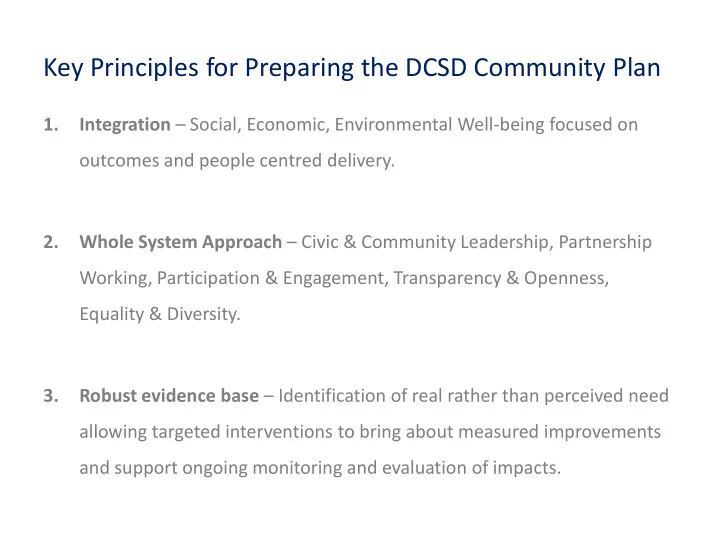

Key Principles for Preparing the DCSD Community Plan 1. Integration – Social, Economic, Environmental Well-being focused on outcomes and people centred delivery. 2. Whole System Approach – Civic & Community Leadership, Partnership Working, Participation & Engagement, Transparency & Openness, Equality & Diversity. 3. Robust evidence base – Identification of real rather than perceived need allowing targeted interventions to bring about measured improvements and support ongoing monitoring and evaluation of impacts.
STRATEGIC SOCIAL Wellbeing ECONOMIC Wellbeing ENVIRONMENTAL Wellbeing Health & Communities Business and Culture Environment and Regeneration EQUALITY Community Development: Entrepreneurship, Enterprise and Physical Regeneration: • • Partnership Regional Competitiveness: Planning and physical regeneration • • • Shared space Job creation Village, town and city centres CROSS CUTTING: • • • Diversity and ethnicity Start-up, inward and Social and Affordable Housing • • Neighbourhoods indigenous investment Natural and built environment Good Relations • • • Communities Innovation, R&D Conservation • • Marketing Promotion • Specialisation & Industry Health and Wellbeing: • clusters Health education and Infrastructure, Energy and Transport: Sustainability • • Strategic alliances promotion Integrated transport • • • Social economy Promotion, control and Renewables • enforcement Waste • • Rural Development Community safety Education and Skills: Broadband • • Sports development Employability • • Leisure Services Lifelong learning • New technologies • Manufacturing Early Intervention • • Schools, colleges, university UNICEF Child Rights Connectivity and Access • Family Support • Tourism, Arts, Culture: Literary & Numeracy • • Assets growth and promotion Life Stages • Festivals, Arts and Events • Communications Language development • Creativity
Proposed Thematic Groups Social Well-being • Community Development • Health & Well-being • Early Intervention Economic Well-being • Entrepreneurship, Enterprise & Competitiveness • Tourism, Arts & Culture • Education & Skills Environmental Well-being • Infrastructure, Energy & • Physical Regeneration Transport
Proposed Thematic Groups • Support the preparation of the Community Plan. • Increase participation and collaboration. • Participants bring experience, expertise, knowledge and willingness to work for the betterment of their local community. Largely 3 main functions: • 1. Identify the needs, challenges & inequalities. 2. Identify current provision of public, private & community services – What is working well. 3. Identify strategic priorities and key actions to achieve agreed outcomes.
Process So Far…. July 2014 → c. 130 people attended a workshop on the introduction to • Community Planning. September 2014 → c. 130 attended a workshop on how we might go • about preparing a Community Plan. November 2014 → Community Plan Task and Finish Group • Advise on evidence gathering methodology Consider an overall framework for a community plan and the process for developing it Co-design the 3 rd workshop for all stakeholders – February 2015 November 2014 → Commence statistical baseline: Establishing the • evidence base
Robust Evidence Base Establishing Baseline Position: 1. Collation of official statistics 2. Citizen Survey 2015 Questionnaire – 1400 households Focus Groups (including Section 75 groups)
Collation and interpretation of official data sources • A lot of these data are available for our local areas. • We want to compile them and see how the situation has changed in preceding years and set down a marker to help direct and assess the effectiveness of the Community Plan going forward. • Work with stakeholders to fully understand what the data are telling us in the light of local knowledge. This collation of data is only one part of the process. •
Citi-scope Survey and Citizen Survey Citi-scope survey 2009 and 2012 Underlying Principles: • Inclusivity Openness • • Transparency • Strong stakeholder involvement • Best Practice Apply these principals to 2015 Citizen survey across the new Derry City • and Strabane District Council area
2015 Citizen Survey • Citizen Survey in early 2015. • 1,400 households, randomly selected across the new Council area. Recruitment of enumerators – community based approach – training and • capacity building – long term positive impact. • Survey will ask questions not necessarily collected by official sources. • An attempt to ‘fill in the gaps’.
How Citizen Survey feeds into Community Plan Community enumerators Idea Pilot survey generation Community Plan Key stakeholders Feedback / Council members Full survey
Outcomes/Delivers o review • Comprehensive 360 • Broad based information data set Stakeholder Buy-in • • Context of need/where we are so that we can determine where we want to be
Recommend
More recommend